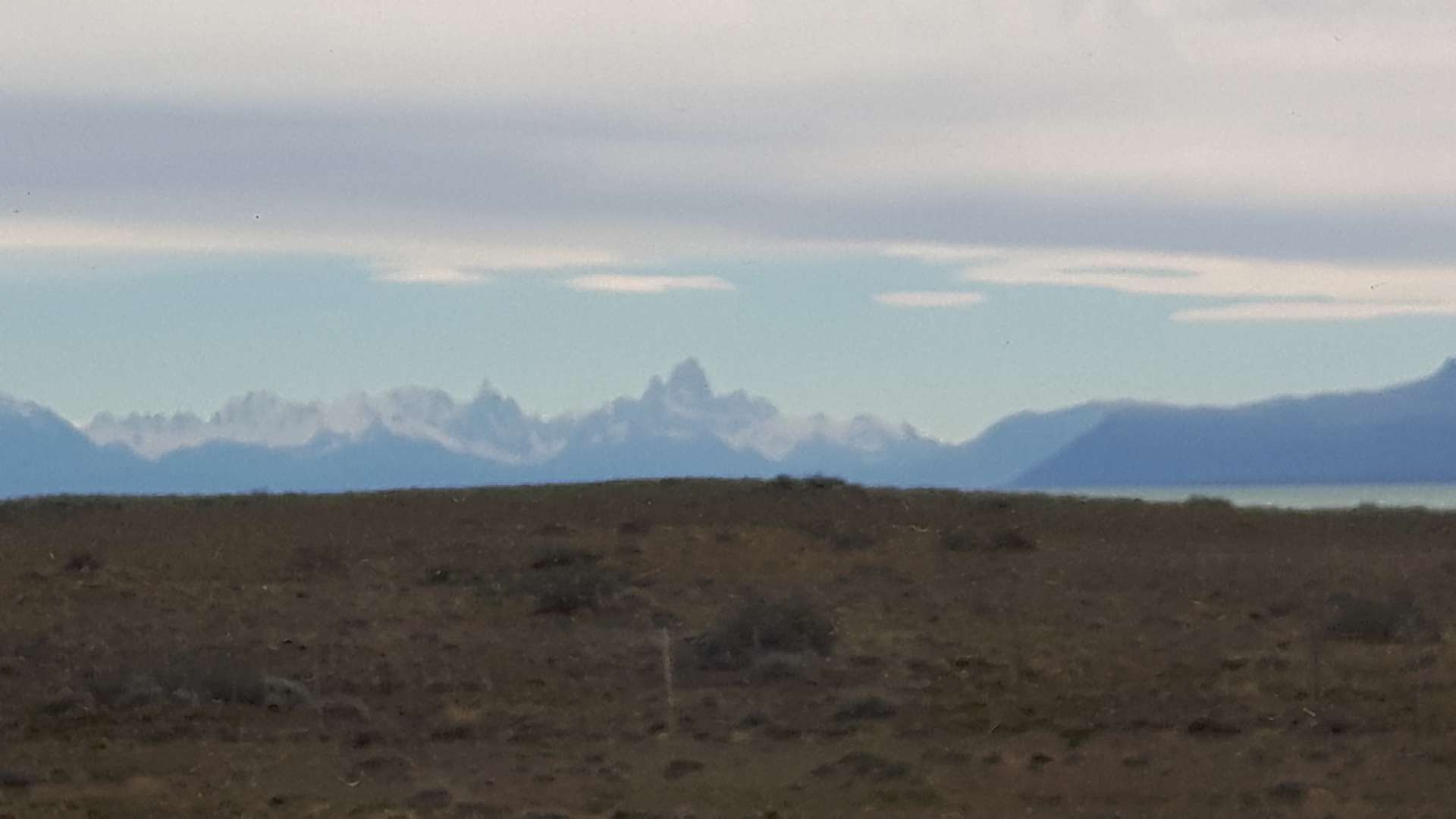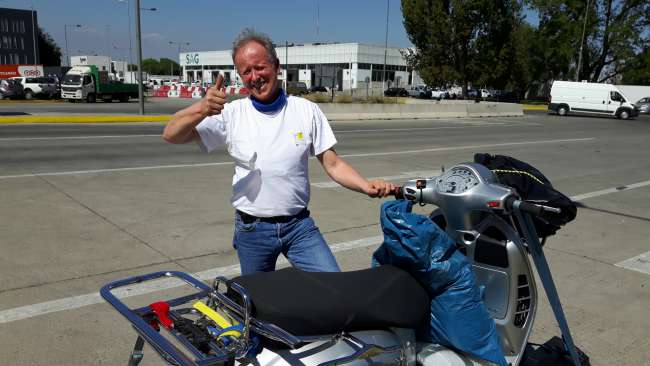from 20.06 .: Llachon / Lake Titicaca - 3,800 m
प्रकाशित: 26.06.2017
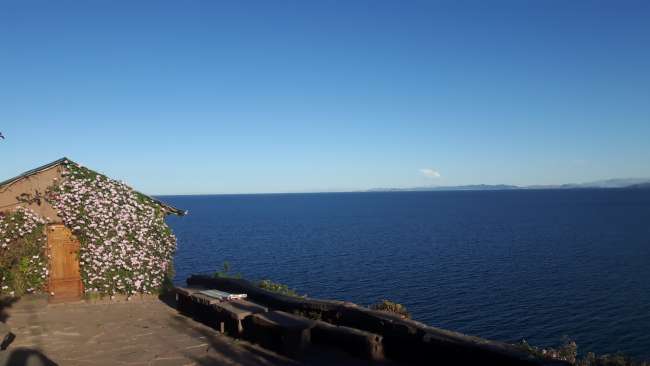
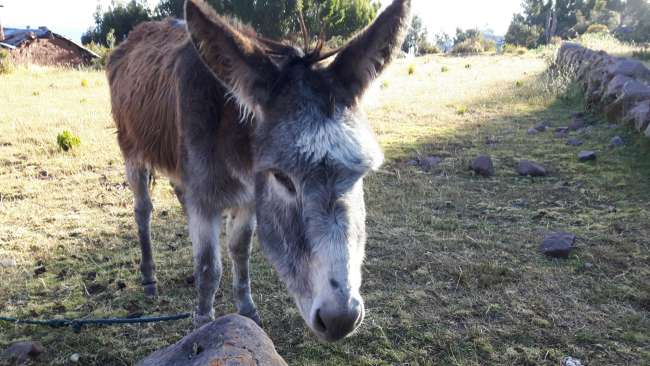
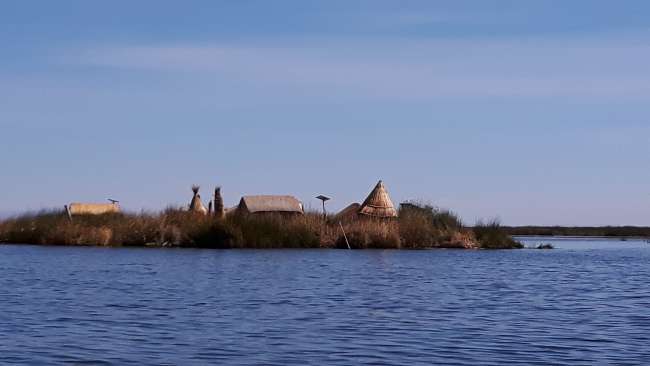
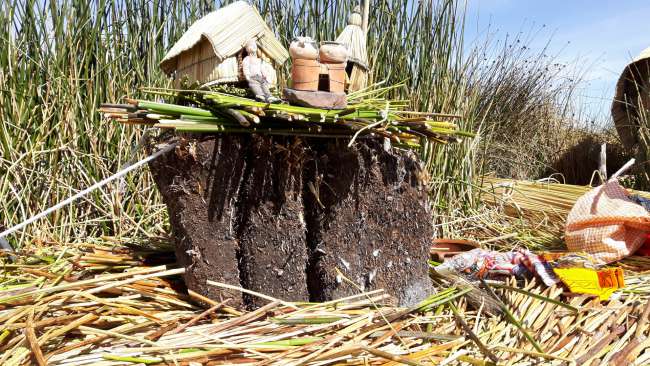
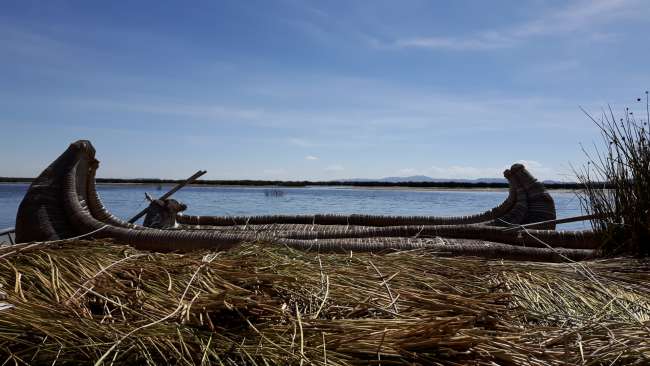
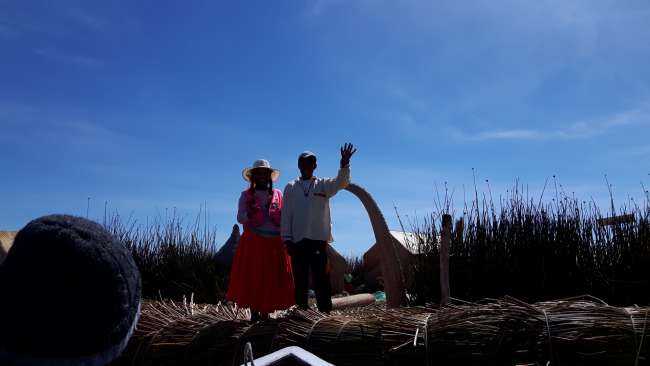
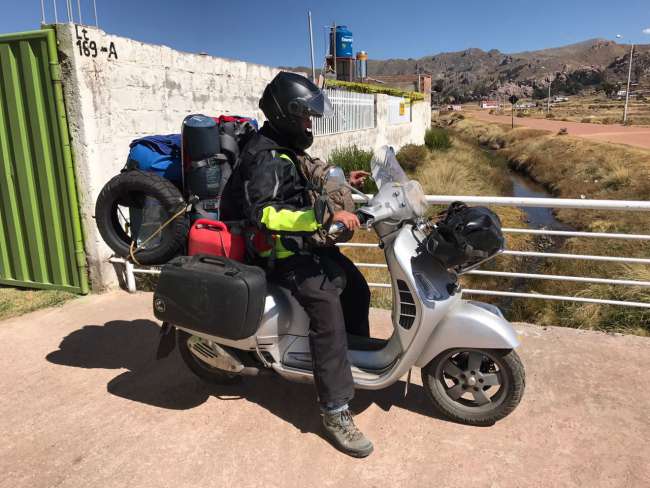
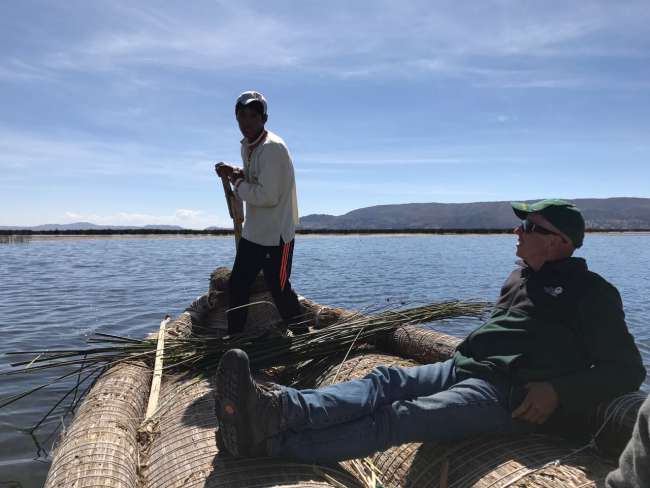
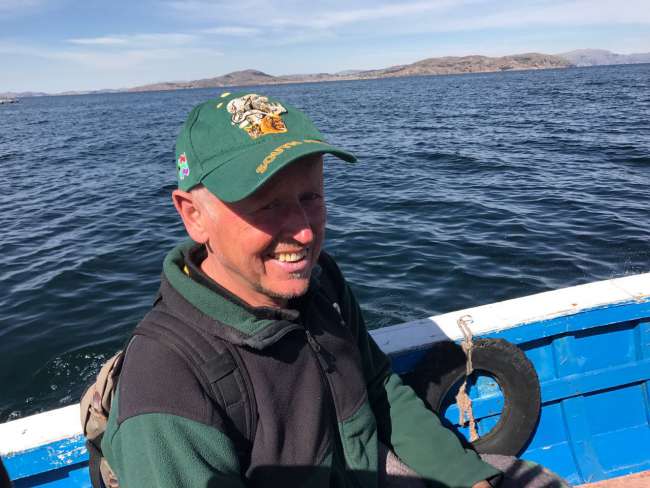
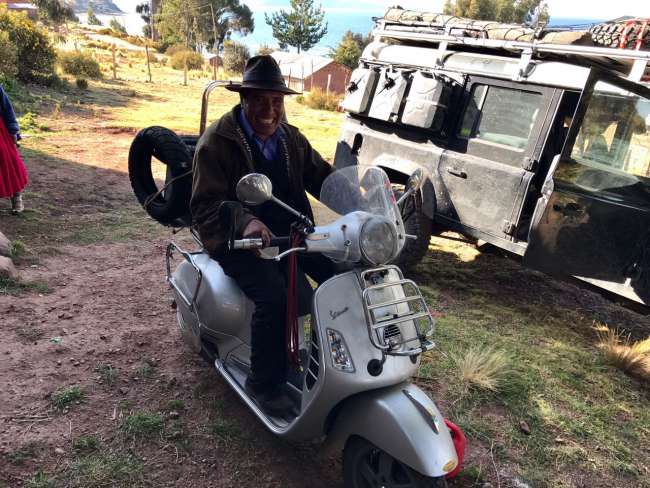
समाचार पत्रिका के लिए सदस्यता लें
20.06.:
today is departure day. Rolf and Sandra have made me curious about the hostel right by Lake Titicaca, but they are not sure if they want to go there because there is no secure parking for the defender.
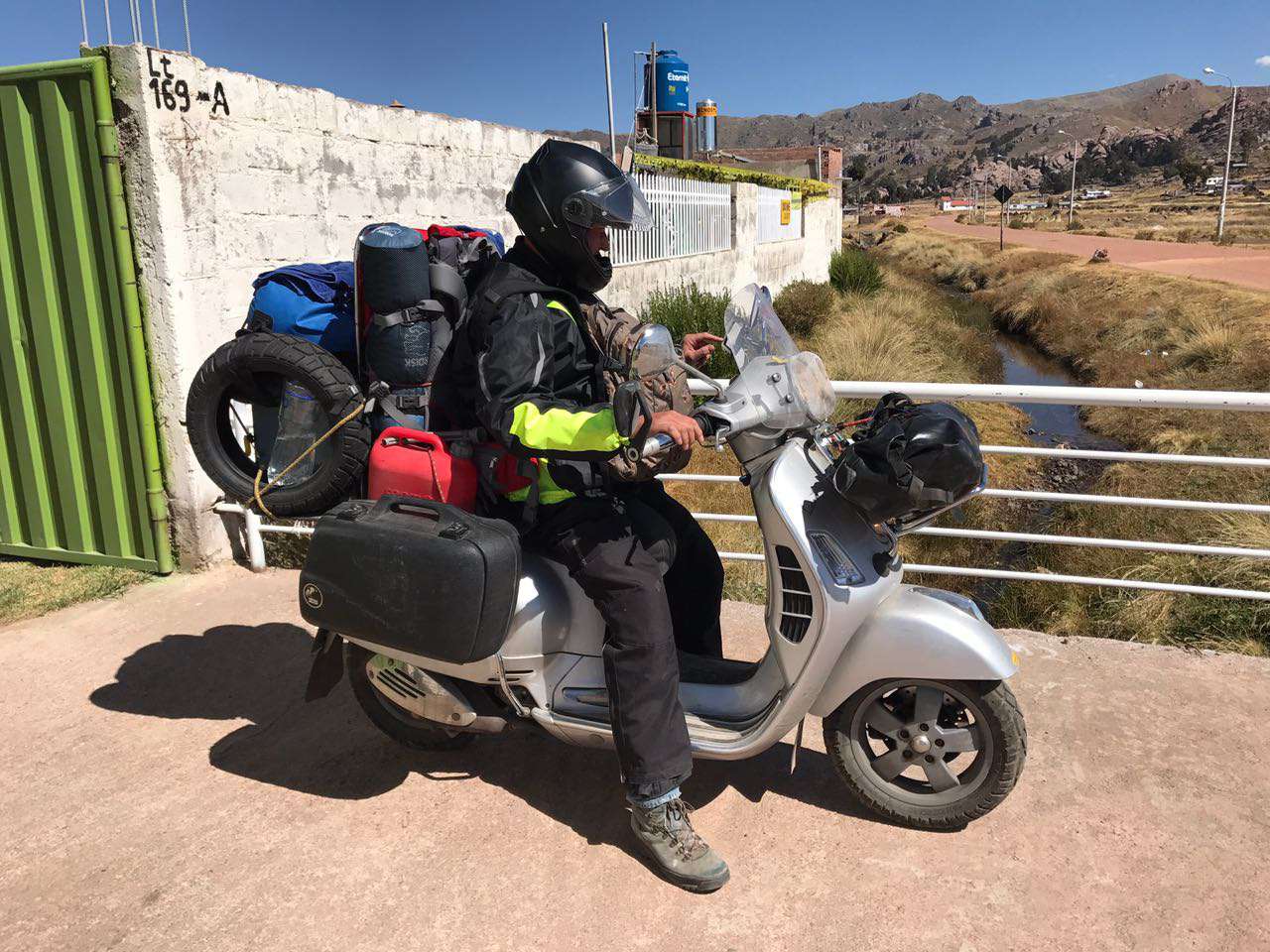
Is the satnav set correctly? photo: rolf l.
Short farewell, video recording of my departure, police and customs check, and confidently presenting my now complete documents.
I'm looking forward to bypassing Puno on the waterfront road and later orienting myself towards Llachon - where the hostel is located - but it turns out differently.
I am redirected to the city, which is located on a steep slope. I have a bad feeling. How will the fully loaded 125 cc Vespa manage it? Once it has momentum, it's fine. But if traffic lights force me to stop, the approach is even more difficult than in Arequipa. Tight curves, potholes, bumps, rain drains at intersections, and red lights make me become a traffic rowdy. I overlook a red traffic light, ignore the double line, and overtake a slower and terribly noisy collectivo at a spot where I wouldn't overtake with a car. The Vespa is slim and I manage to pass by, the oncoming traffic is considerate. The other legal alternative: stop and push... push? In between, I had a great view of the bay, but I couldn't take any photos.
I leave Puno and find myself on the road that leads to Juliaca, which is only 50 km away. Am I wrong? I certainly don't want to go there anymore! But then I see signs in the direction I want to go, the satnav confirms it, and very soon I find myself in deep solitude. The road gets narrower, potholes increase, there are two inclines to overcome, and I discover rural Peru. Mud houses are scattered on the slopes, sheep graze, women working in the fields wear traditional Peruvian clothing with the typical wide-brimmed hat and colorful wide skirts.
After the hustle and bustle in Puno, I am welcomed by a very peaceful atmosphere. I drive carefully because just one moment of inattention can cost the Vespa its front wheel - and more. And then: in the middle of the road, a pothole the size of a car tire yawns at me, lying 5 to 10 cm deep. Lucky me!
I take a break in a small and dreamy town called Capachica in the marketplace. Unbelievable! After the monotonous noise of the engine, absolute silence surrounds me. The mayor, dressed in a suit and tie, just came out of the town hall, notices me out of the corner of his eye, and goes to a small store for refreshments. A little further on, I see mechanics sitting in the sun in front of their workshop, a poor and sick-looking woman sits just a few meters away from me on a wall and watches me. She joins me without saying a word. What should I do? I always find it difficult to give people money. I think it has something to do with their dignity being taken away with this gesture. Is it better to give them something to eat, like an apple? Probably not... I decide to do both - she finds a more distant spot and I leave this cozy yet strange place. A few days ago, there must have been a fiesta here, the entrance and exit gates are decorated with colorful flags.
It's maybe twenty to thirty kilometers and I'm in Llachon, where the hostel is supposed to be. The big Lake Titicaca (18 times the size of our Lake Constance) stretches out in sections in front of me. The town's marketplace is empty - a beautiful afternoon atmosphere that promises that the people are still in the fields. My satnav doesn't know the way, so we take a break. After all, to get to the marketplace, I have to maneuver around big rocks and then overcome a step that is impossible to manage the first time. A man sits on a ledge of a house, watching me amusedly. Hopefully, I ask him if there's another way to get to Llachon. He nods. So I first take the other route he showed me, but I quickly realize that it leads me in the wrong direction. Turning around on a steep road requires a lot of concentration and slow movements. Once the Vespa is flat, it's a bigger task to bring it back to the upright position... I drive back, meet fully loaded farmer women on their way home, ask again, and am sent back on my way. No question: I'm in Llachon. I return to the spot where I started, the Peruvian has gone his own way. I make a second attempt to conquer this insurmountable incline. This time it works. I bypass the bigger rocks and the momentum is enough to barely make it to the marketplace.
I know from the iOverlander entry that our hostel owner is known in the village. I ask for Felix and a passing motorcyclist is more urged than asked to lead me to the hostel. From the internet entry, I know that the path is unpaved, has deep ruts, and can be difficult to pass at times. We have no choice but to follow the youngster who is rushing away. On the way, we meet uniformed schoolchildren who amuse themselves about me and my Vespa, but still greet me nicely and shout something after me. We first go downhill, but then steeply uphill. The Vespa manages it and we do it a few more times. Since I don't want to lose my guide, I have to drive as fast as him, and that gives me the momentum for the rocky and steep sections.
Finally, we are there. I have the unobstructed view of Lake Titicaca! Some boats bob around, but otherwise nothing. I still don't know where I will be staying, but it can only be down by the water - as the internet entry says.
A Peruvian woman, who later turns out to be Felix's sister-in-law, goes down - probably 100m downwards - and meanwhile I try to start a conversation with my motorbike guide, who is joined by a friend. They don't know Europe. Indifferent shrug... they are more occupied with themselves and I am too distracted, so nothing happens. Felix is not here. But I am allowed to park the Vespa on the property of the house across the street, which is not easy. It needs another incline and a sharp curve on rough terrain. After several attempts, I am allowed to leave the Vespa there. Just as I am packing up, I hear a familiar diesel noise and soon after, I see Rolf and Sandra struggling up the hill and parking next to me. They visited another place before and are surprised to find me here because they didn't think the Vespa would make it through the last two kilometers.
So we go together with the sister-in-law and others who help us carry our luggage down and when we arrive at the place where we can stay, we can't believe our eyes!!!
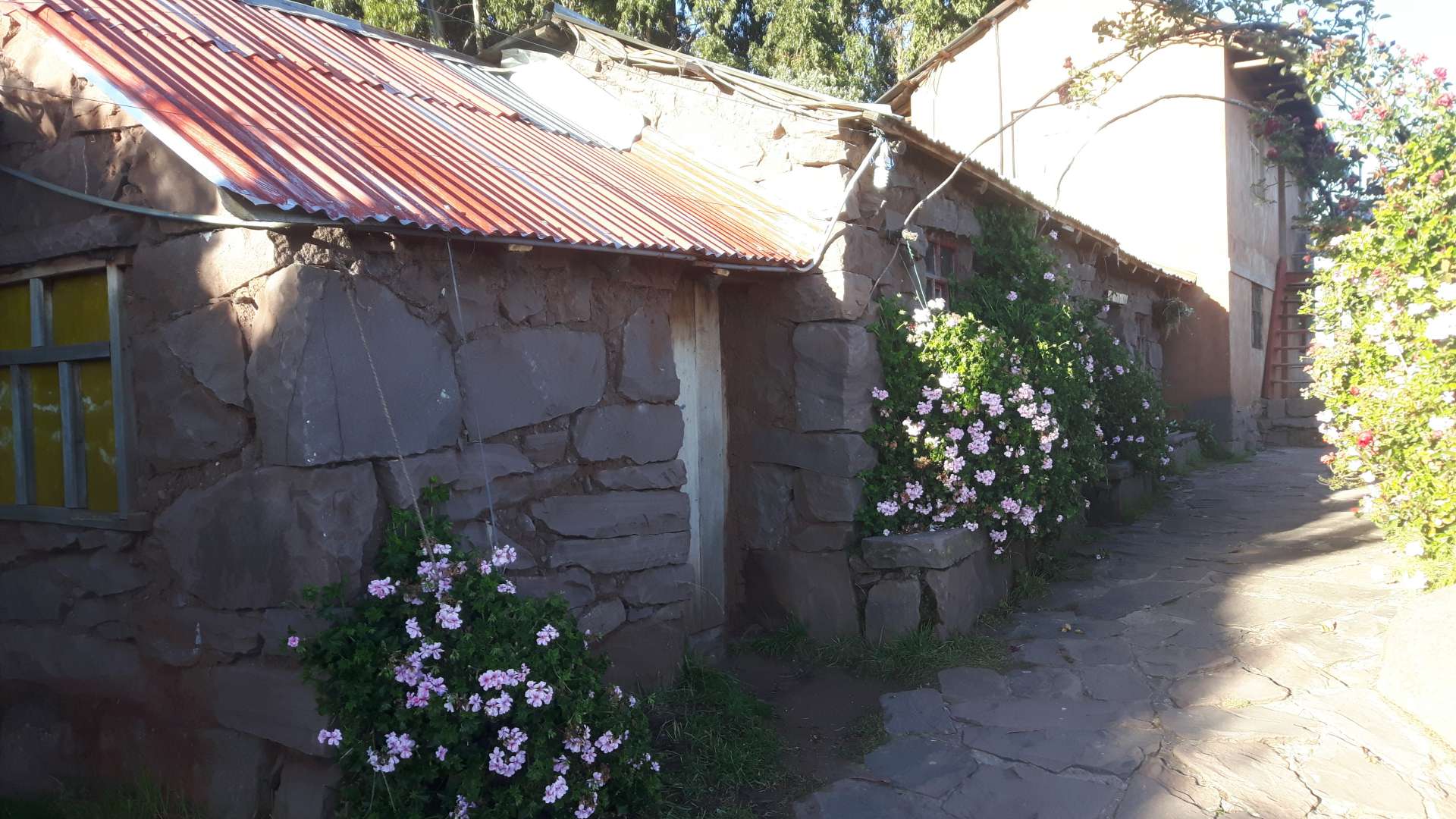


the deep blue Lake Titicaca is ours! We are standing on a terrace paved with granite stones, the buildings made of reddish clay are covered with red and white geraniums, a freestanding building houses the common room, where dinner will be served later at 7:00 pm. Felix has arrived by now too. He, his sister-in-law, and his wife are all smiles. Behind us is a two-story adobe building with a gabled roof - also something special, as most houses in the cities are equipped with flat roofs - a wooden exterior staircase leads to the second floor. Our hostel rooms are located on the ground floor in a neighboring building with a great view of the lake. Bruno, Sandra's and Rolf's dog, has already explored the kitchen and been served a large bowl of rice and old bread. There is a second dog who generously provides his territory and also does not make any claims to his bowl.
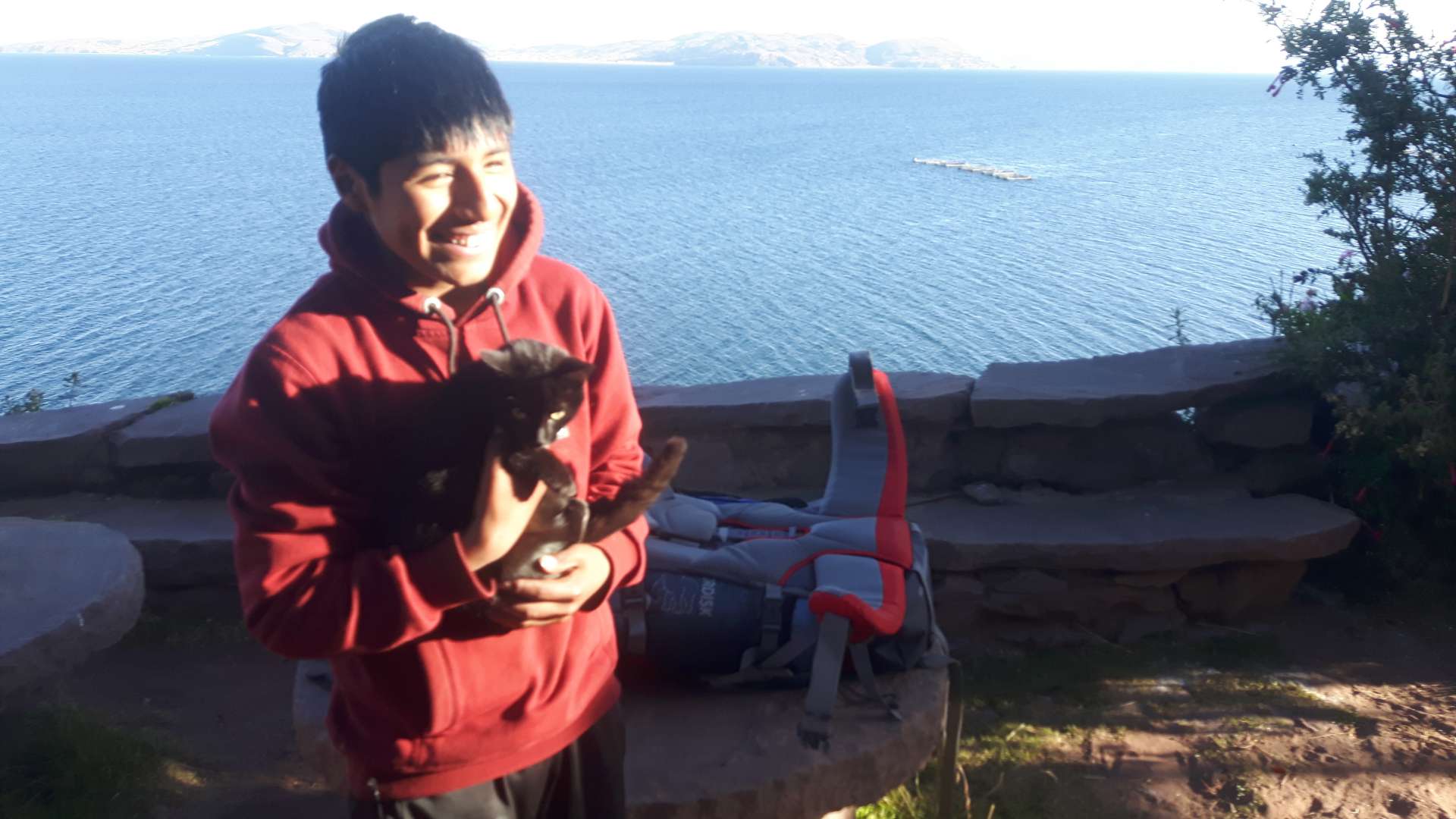
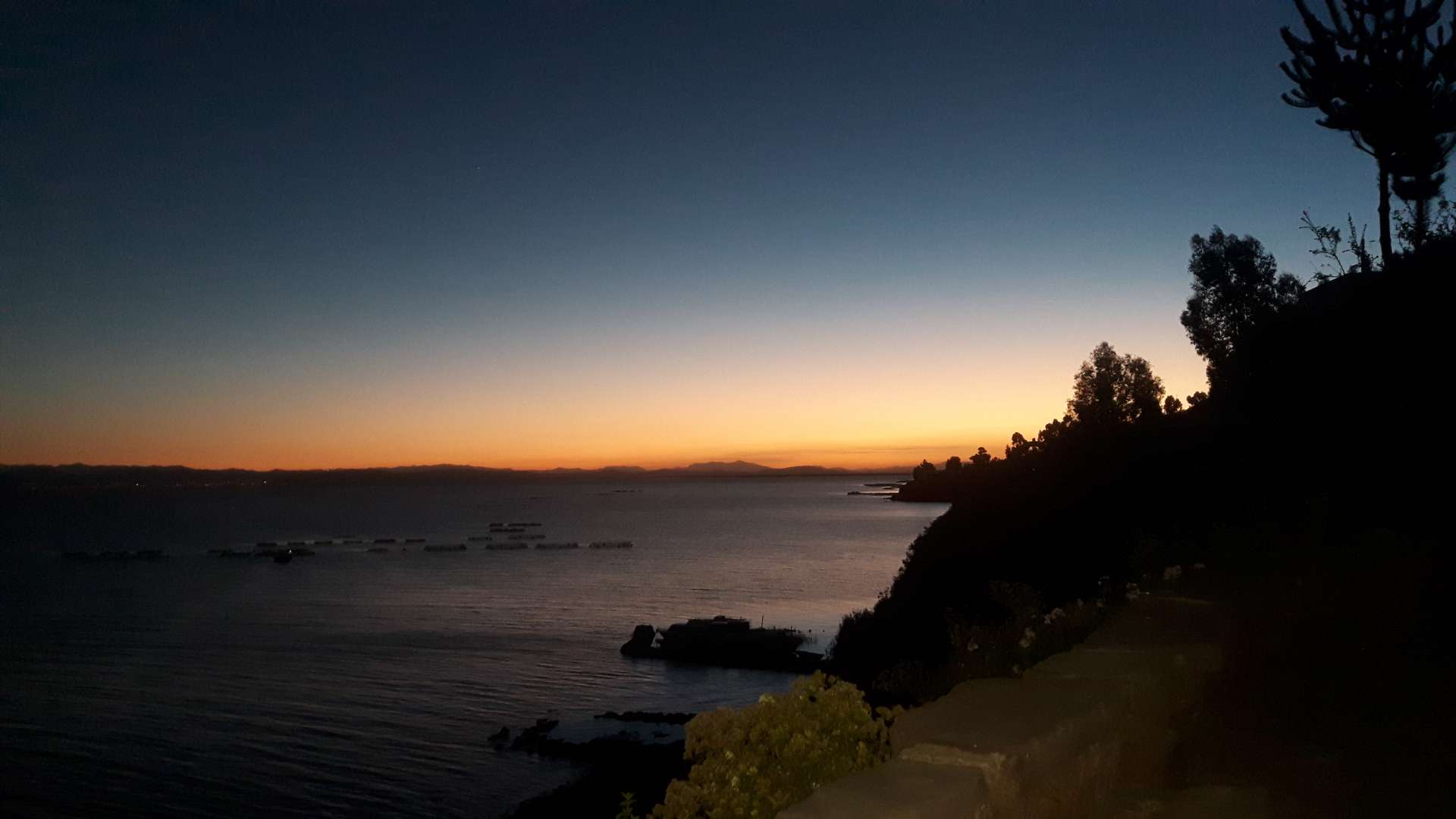
Our rooms, separated from each other by a shared toilet, feel very cozy, the beds are covered with bedspreads in the typical bright Peruvian colors. The ceiling of the rooms is adorned with insulating straw mats, the adobe walls are also protected from the cold with straw mats. The shower is housed in another little house. We take note with pleasure that we can use the toilet without a nightly walk through the cold air - as we had to do in the previous nights in the other hostel.
The warm afternoon sun is still there, concealing from us that it will get very cold after it sets. I have time for a nap in my sleeping bag and at exactly 7:00 pm, we are spoiled with hot vegetable soup and a main course.
A French couple and a German from Halle, whose partner is also French, have joined us. I estimate that they are around the mid-twenties. She approaches people and asks open questions. So I casually learn that she is a singer and sings the lyrics written by her brother in the local dialect of Halle. Rolf gives me the hint to tell her about our house and barn concerts. She is interested - I get her CD, which she happens to have with her - June 2, 2018 suits her - we will stay in touch.
The temperatures drive us to bed at half past nine. I feel like I have ridden miles and miles - it's so different here - the people and also the character of the surrounding landscape.
21.06.:
From the internet entry, we know that Felix owns a boat and has personal contacts with the residents of the reed islands. Yesterday, Sandra and Rolf asked him if he still offers such tours, and when he confirmed, we immediately signed up. Sandra also wants to know what we can bring to the people living there. Felix knows their needs and lists quinoa, rice, pasta, caramel for the kids, fruits, and more.
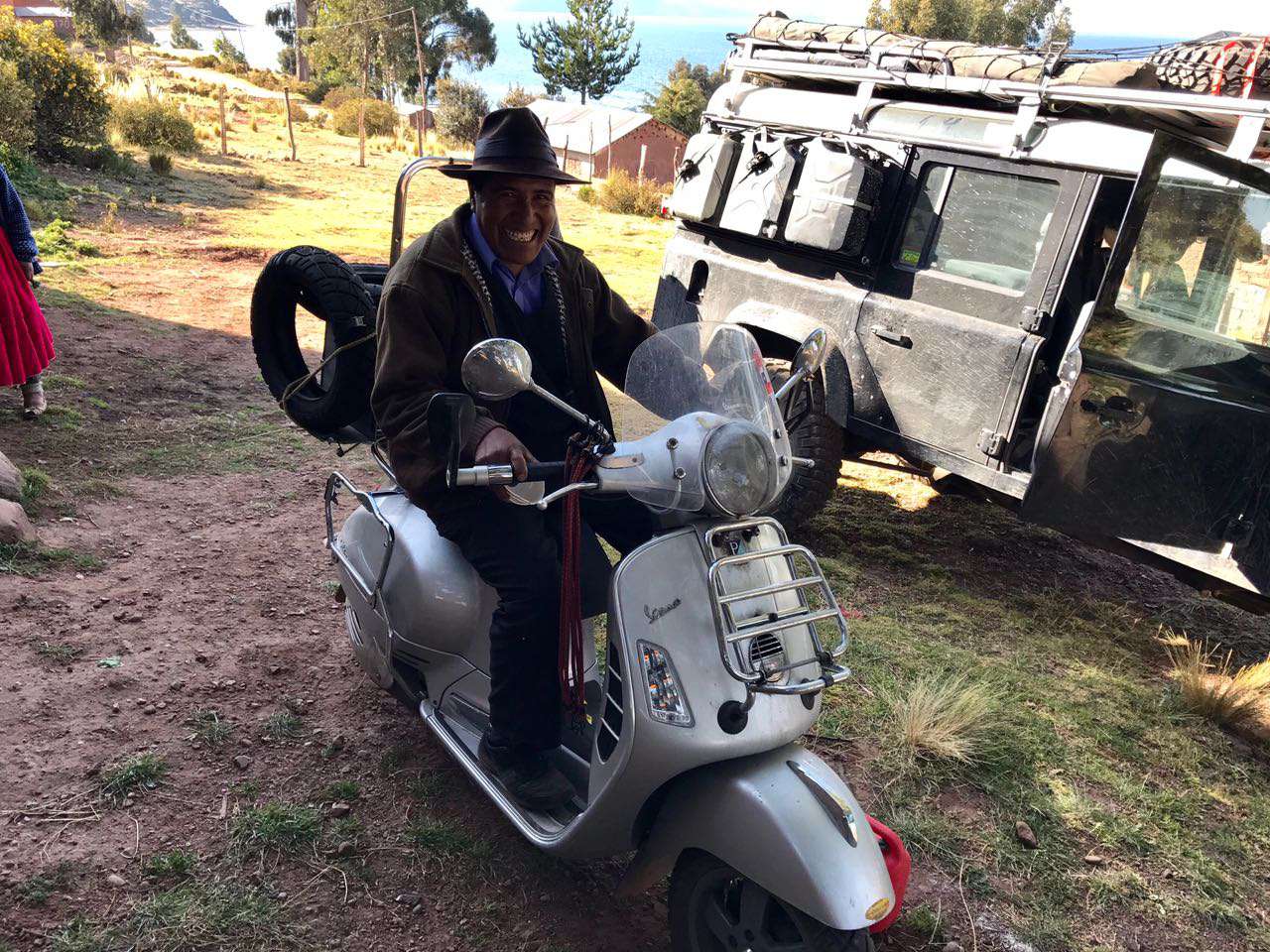
felix experiences the Vespa feeling. when will it happen again? photo: rolf l.
So we have to get up early today. The market in Llachon opens at 8:00 a.m., and we should be in the boat at 9:00 a.m. Ambitious plan! Even more ambitious because we get a proper breakfast: a pancake that reminds me of American breakfast omelettes soaked in maple syrup and bread rolls fried in fat, reminiscent of flatbread. With jam - I suspect homemade. There are thermos flasks with hot water and on plates, there are herbs picked from the garden. If you want, you can also get mate tea from teabags.
When we are at the defender, it turns out that another friend should also go to Llachon. No problem - I will follow on the Vespa. The market in Llachon is very manageable. First, we do some shopping at the grocery store and later buy bananas and mandarins from the farmers sitting on the ground.
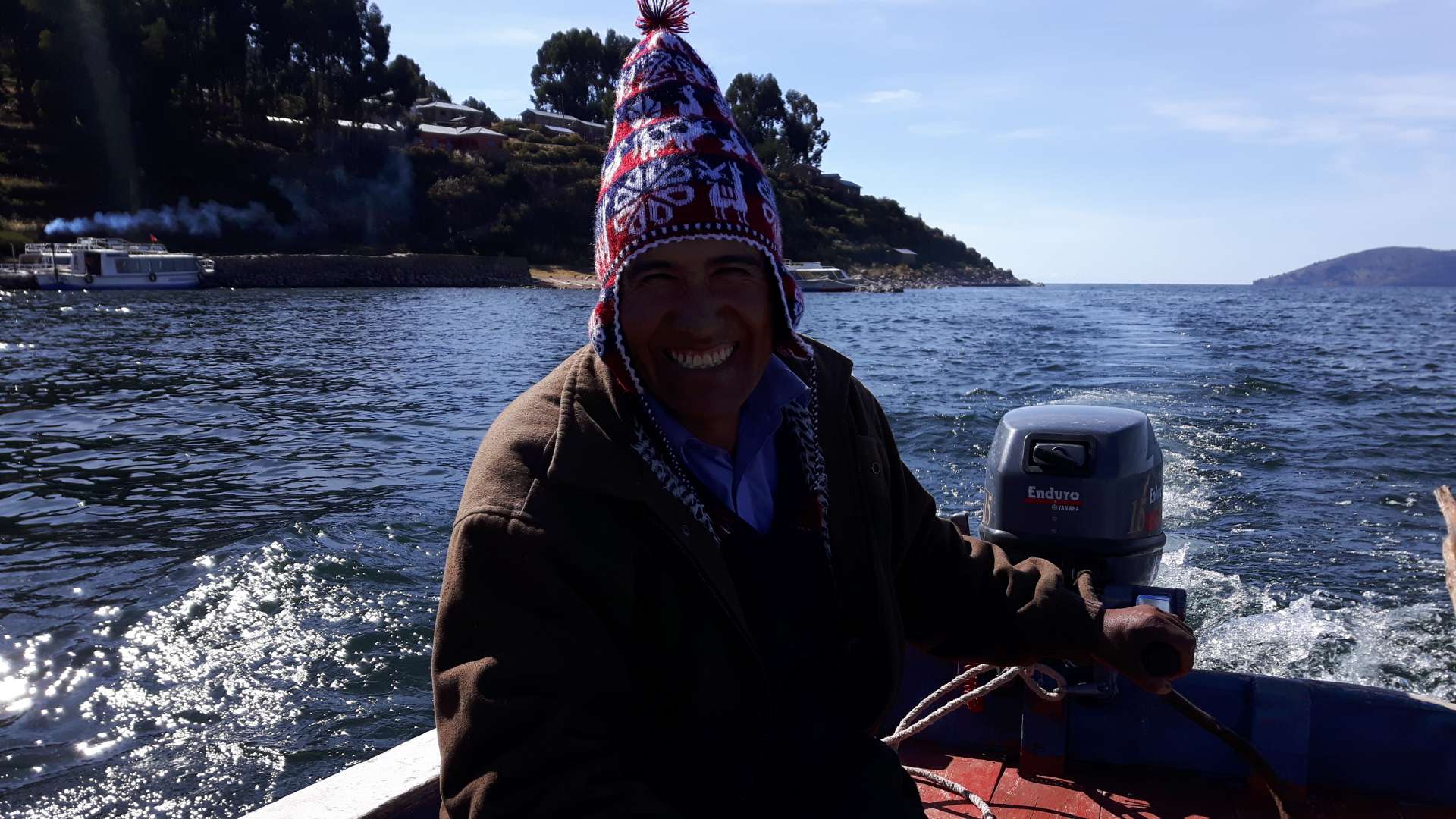
Felix - no words
At about half past nine, we are in the boat - a nutshell with an outboard motor. There are only four of us. The others went to the other islands the day before with a tourist boat and now want to take a walk to the tip of the peninsula.
We are glad that we can sit and surrender to the lake and the landscape. The altitude is affecting me. The approximately 100 m long path up to the Vespa forced me to pause along the way.
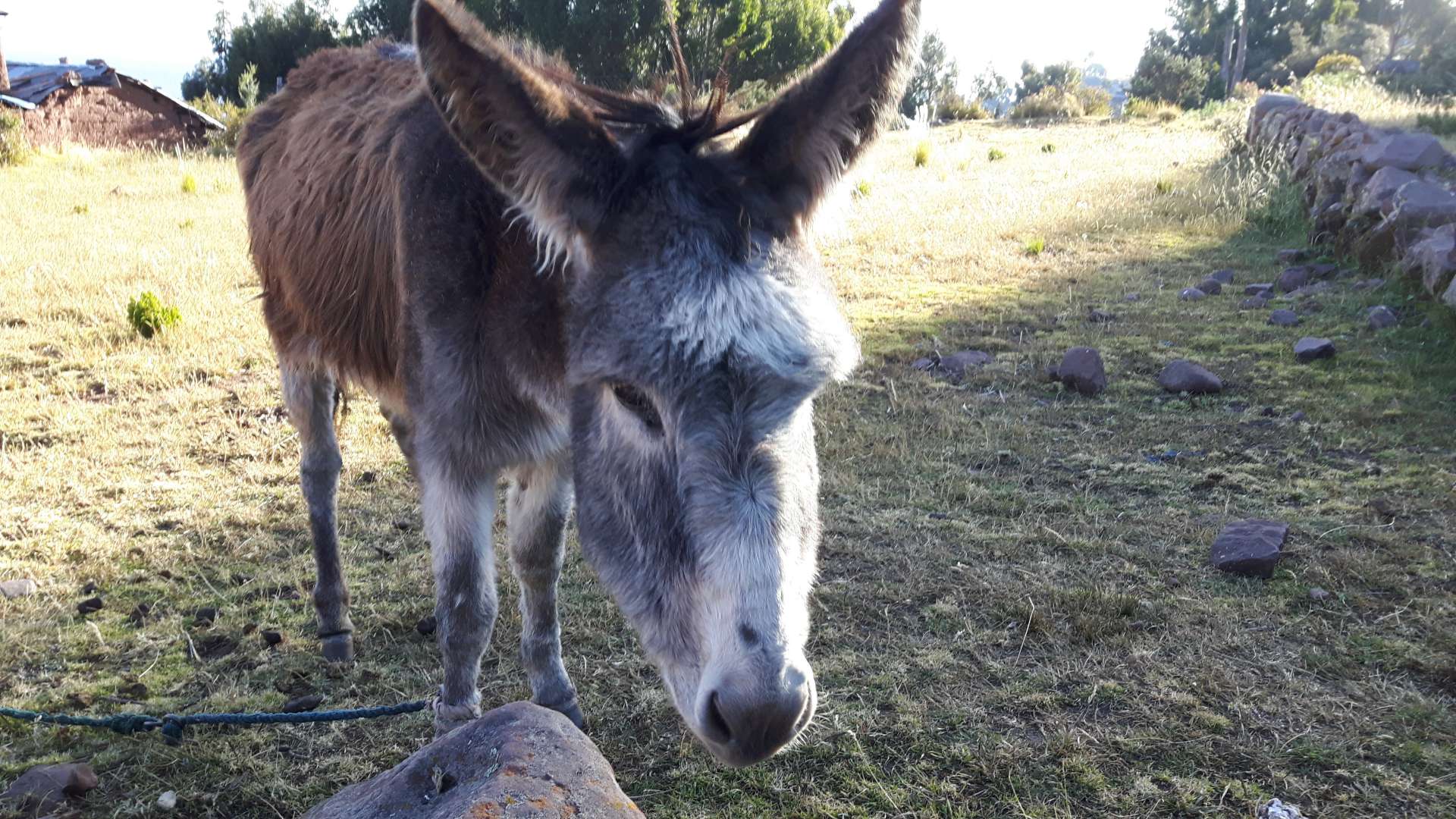
The donkey that belongs to the house
Fortunately, there are enough reasons to stop. There is a white dog looking for attention and a donkey that is very trusting. And two black pigs that also need attention.
Lack of fitness? Absolutely not - the animals want to be petted...
We chug for about an hour towards the reed island. Just like when we arrived - no boat traffic - we are completely alone. We quickly exchange a few words with Felix at the beginning, but then a soothing calm spreads in the boat, and I can switch to standby mode.
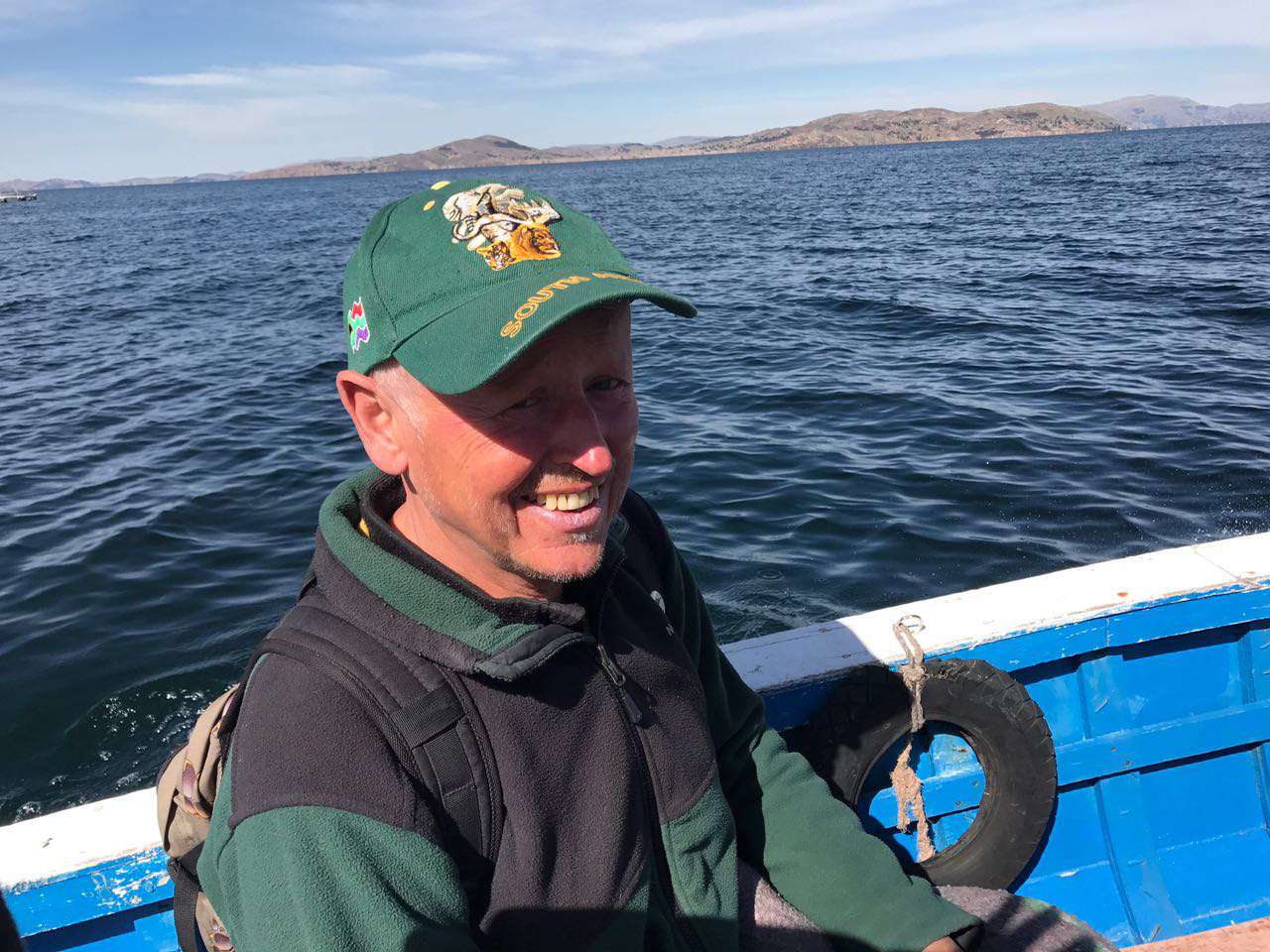
from the road to the water? the Vespa has rest days
photo: rolf l.
However, nothing of sewage is to be seen or smelled here, nor are we anywhere close to Puno or La Paz. We can see the island as we get closer. It is about 100 m² and looks like an oversized rubber boat framed not by rubber, but by reed banks.
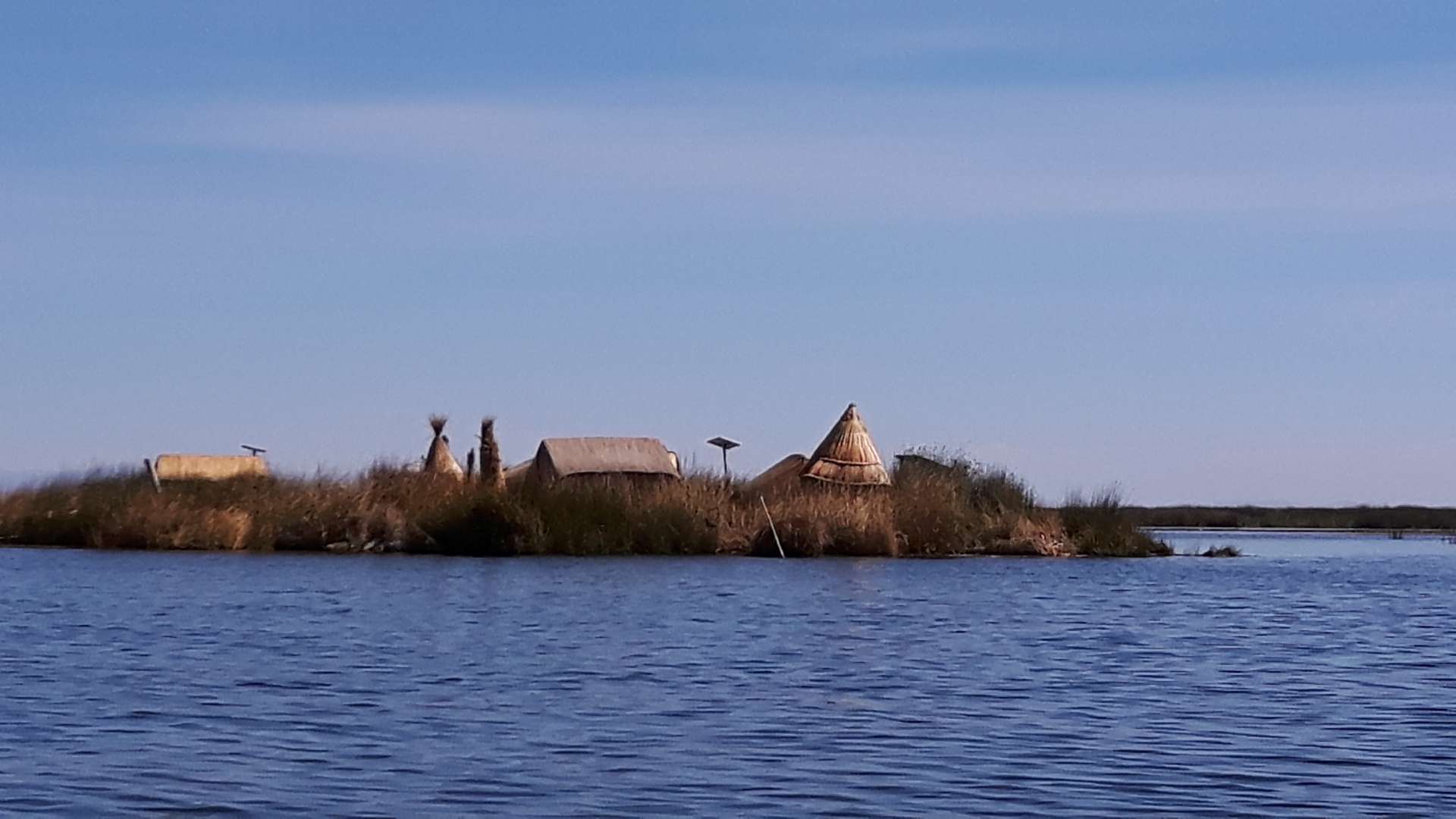
This island is for tourists. The others are hidden in the reed belts
We are welcomed gracefully: the son of the president with his wife. Both are around the mid-twenties. She wears the Peruvian outfit, he wears a folkloric t-shirt and as a sign that he lives in the present, adidas jogging pants...
The change from one floating vehicle to another requires a good sense of balance, and I still have the association with the rubber boat in mind. The ground gives way with every step, not so much that you stumble or fall - but it's unusual. We are led to a seating area created from three reed rolls. Along the way, there are more signs of the passage of time. Solar panels provide electricity in the huts, an old cell phone hangs at the entrance for charging. We are officially greeted by him and his wife
and then he wants to know our names and where we come from.
Then he rattles off what can't be reproached. He is well-prepared.
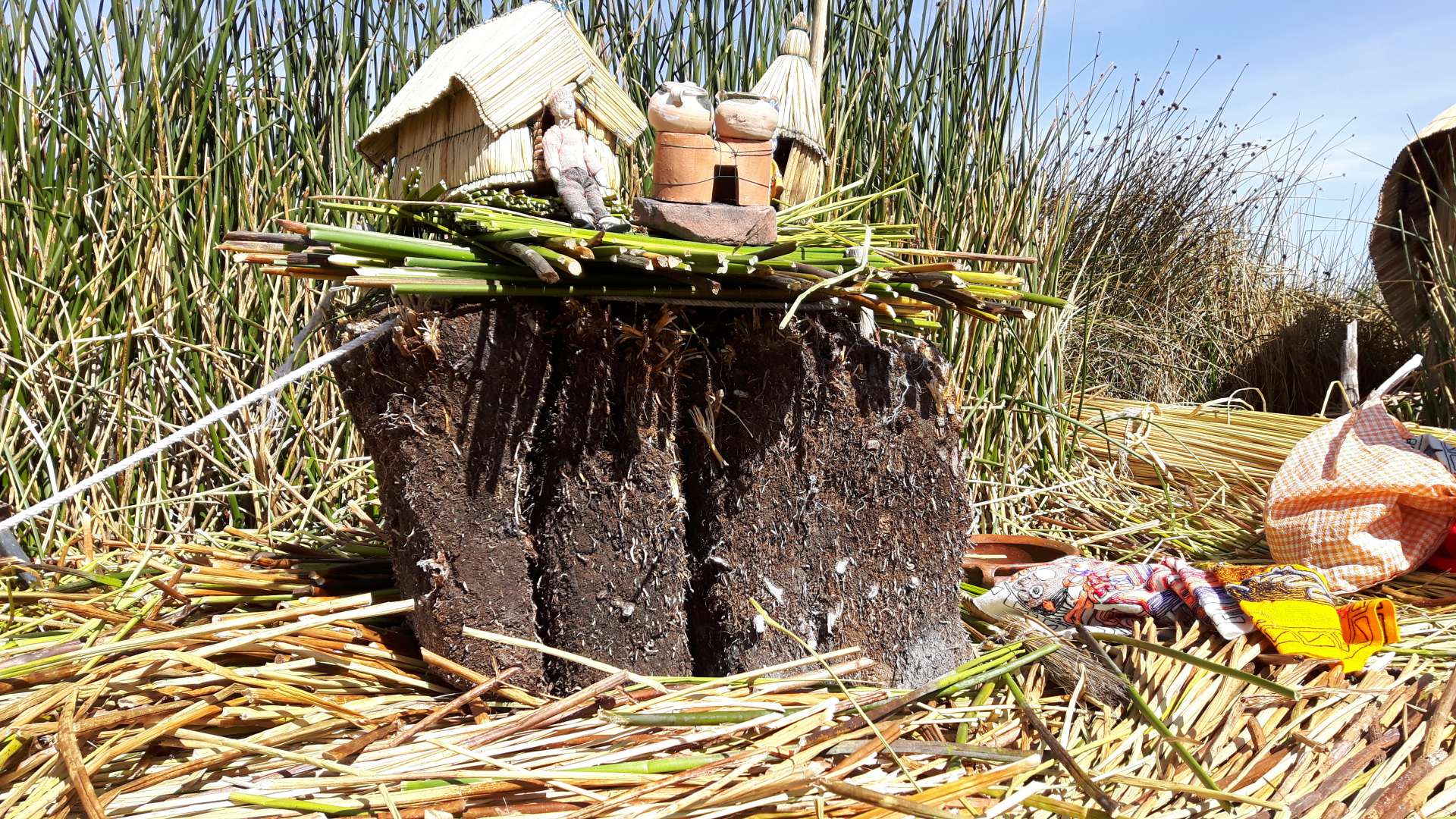
The massive turf blocks with the reed, which are piled up again every month.
In front of us is the island in miniature format, so we quickly learn how it is built. The foundation is turf blocks that are connected to each other and determine the size of the base. Then reed is layered on top of each other in several layers, with each layer at a 90-degree angle to the previous one. The construction is renewed every month. Later he shows us
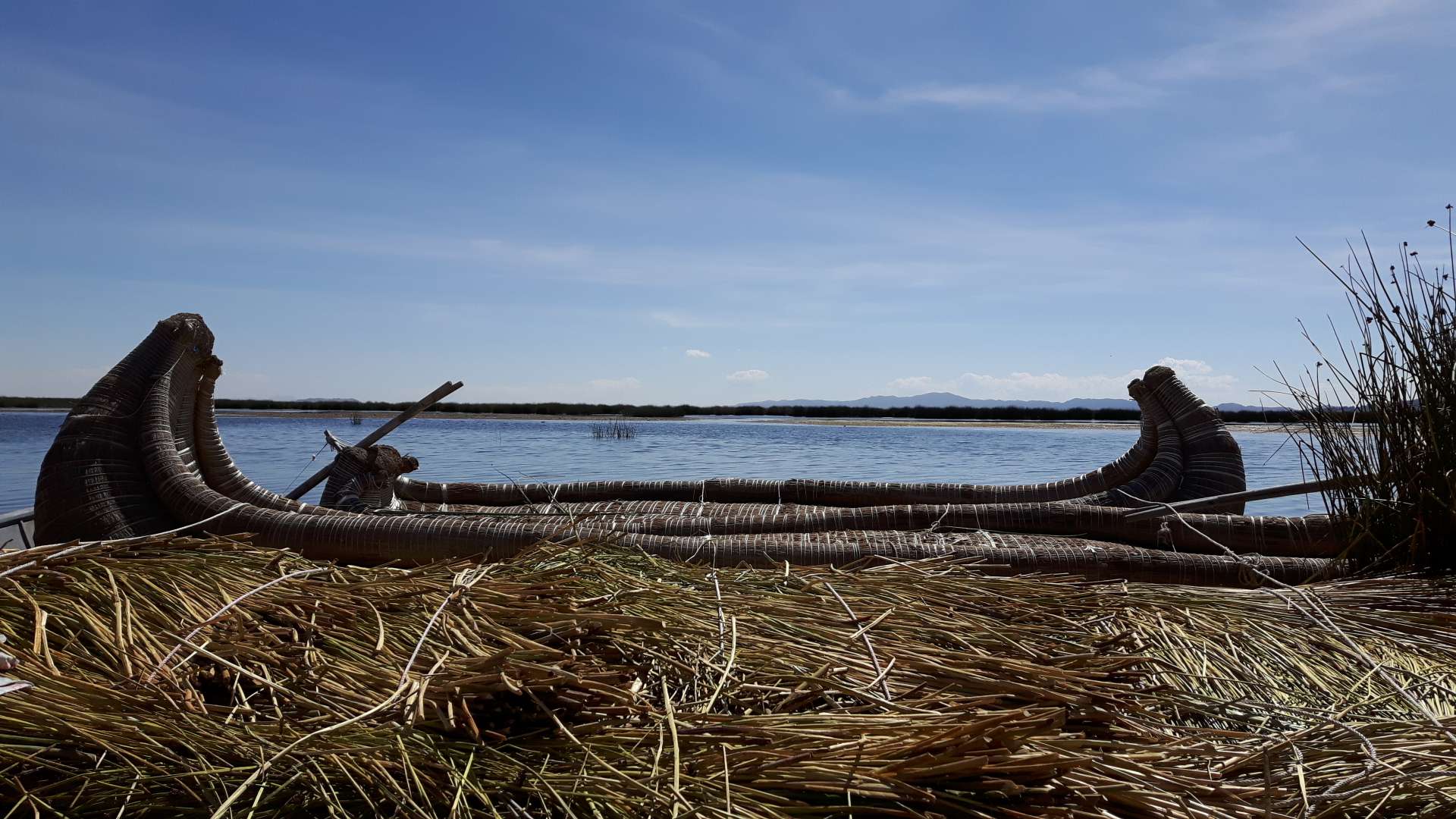
how the reed is harvested during a boat trip with one of his boats, which reminds me of the construction of the Viracocha III. It's cut just below the water's surface so that it can regrow quickly. The top third can be peeled off and eaten like vegetables. This made the ancestors independent from the mainland.

the son of the president explains how the reed is harvested
photo: rolf l.
To prevent the island from floating away, it is anchored to posts that are rammed deep into the ground. Currently, 5 families with 5 children live on the island. Boats with outboard motors are ready for departure to take the children to school on another island, the windowless reed houses show us that they are inhabited, but it is up to the imagination of the island guests to judge whether people really live here or just pretend.
There is supposed to be a system of roads here that connect the islands with each other.
Our bags with our "gifts" are still unnoticed at our boat. It is time to distribute them. But how? There is a lot and handing them over wouldn't work. So we announce the handover and place them on the ground inside the seating area. I actually wanted to "celebrate" it a little and started to artfully stack the mandarins. But that would have taken too long and also seemed a bit immodest. Rolf then does it in a Swabian-rational way and puts the wrapped bags in the middle. That's good too. The son of the president has another blanket brought, in which the gifts are wrapped and taken away.
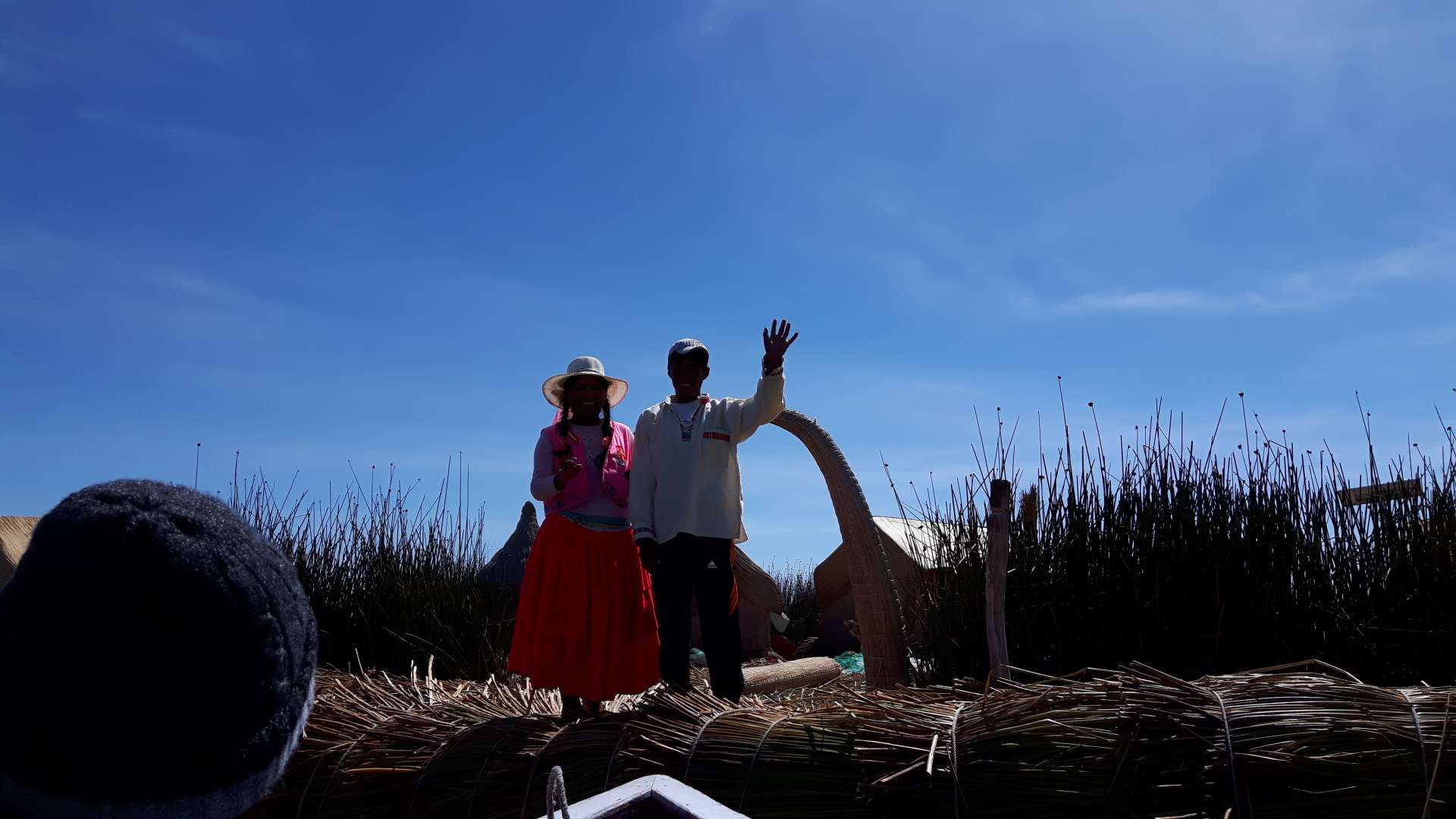
Friendly farewell
We say goodbye with a handshake and a friendly wave from the young couple escorts us back out onto the open Lake Titicaca.
Somehow we don't know how to handle what we just experienced and leave it at that for now.
We quickly return - the outboard motor stalls twice. I remember my trip with Nora on the Amazon when the engine of our boat actually died and Marco, our guide, let us paddle to the next station. In our case here, only reed grass got caught in the propeller. We would have had to paddle for a long time to get back to land.
We arrive just in time for lunch. Our three French people and the singer from Halle are still there. We have the delicious vegetable soup again and a main course.
The rest of the day is relaxation in the truest sense of the word. The view of the water is calming, the altitude prevents further physical exertion, only Bruno provides some excitement, be it the tempting smells from the kitchen that keep attracting him or territory divisions demanded by Bruno, which end in a scuffle.
Once the sun is gone, the sleeping bag calls for a nap, then dinner, and soon the sleeping bag again. Pure recovery!
22.06.
Today - our last day in this paradise - starts with few differences as the previous day ended. Rolf repeatedly makes desperate attempts to take us for a walk to the tip of our peninsula, but whether it's the upcoming lunch or simply our laziness that prevents this idea from becoming reality immediately. There is a black cat that keeps us busy and Bruno, who needs to be reminded of his good manners. The cat and the dog both make a detour, the cat makes a hump with a thick tail when Bruno approaches, but in the evening, relaxation sets in, and it blinks drowsily in the sun when Bruno curiously approaches. Yes - we behave like animals. They show us how to do it. Doze, watch, do nothing and drink beers.
In the evening, we think about the next day and the hardships that lie ahead. The luggage has to be carried up the long 100 m to the car. I have my two suitcases and the backpack down. Rolf suggests that we can store them overnight in the car - there's no doubt about it - let's do it. I carry my two suitcases and the backpack, stupidly tighten my kidney belt too tight, and come just to the pigs. Lack of oxygen doesn't come - not a good feeling, but when I take off the kidney protector, everything is fine again. Short break at the donkey, then the incline up to the car, and we made it. Once everything is stowed away, we implement Rolf's suggestion and walk slowly along the path to the tip of the island. The sun is already at an angle and distributes beautiful light. To the left of us are the clay houses on the grassy hill, below us to the right are the lake and the farmsteads with their detached toilet huts. We are not four for long. Dogs join us and the pecking order is quickly clarified, actually Bruno is the boss, but a small yappy dog wants to be at least in the second row and succeeds in forcing a much larger dog into a defensive position. Sandra is a dog expert and explains to me the different behaviors of our companions. But Bruno remains unquestionably the boss. We don't reach our destination, but the anticipation of cheese and red wine before our actual dinner makes us forget quickly. There are no new guests - alongside the vegetable soup, we get a chicken drumstick with rice - maybe it's the red wine that makes me not perceive the cold as much as the previous evenings. Felix had to go to Lima in the morning. He is the president of the local tourist association and is visiting the congress with a colleague from Puno. The bus ride takes 24 hours, the conference is on Friday, and he wants to be back in Llachon on Saturday. For a few hours of conference, such an effort...? In this context, we promised him in the morning to write a good text on iOverlander.
समाचार पत्रिका के लिए सदस्यता लें
उत्तर
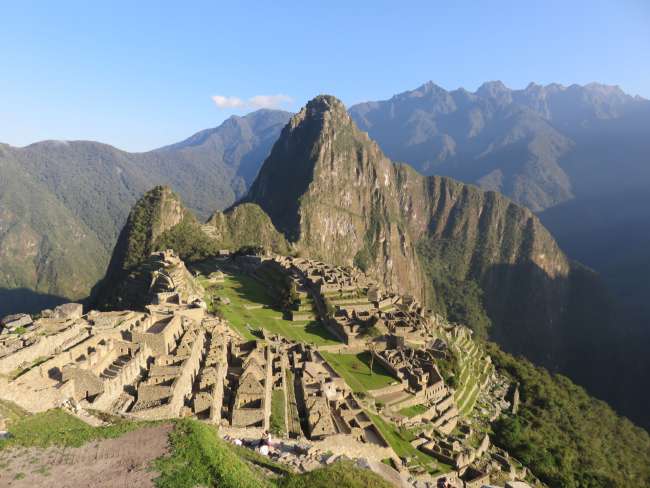
यात्रा रिपोर्ट पेरू
